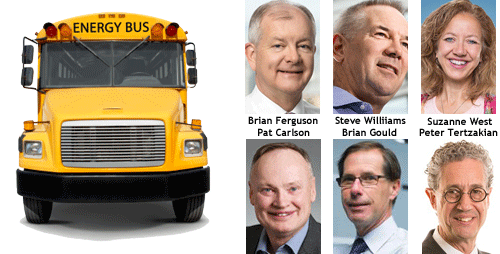 It’s time for an Energy Exposed Trust Tour.
It’s time for an Energy Exposed Trust Tour.
Load a bus in Vancouver with energy sector leaders: Steve Williams (Suncor), Brian Ferguson (Cenovus), Suzanne West (Imaginea), Pat Carlson (Seven Generations) and Bryan Gould (Aspenleaf). Also invite Ian Anderson (Kinder Morgan), Russ Girling (TransCanada), Mark Taylor (Alberta Energy Regulator) and Joy Romero (Canadian Natural Resources Ltd.).
Put Peter Tertzakian (ARC Energy Research Institute) behind the wheel as tour guide and chief navigator.
Don’t invite corporate handlers, public relations staff, industry lobby groups, media, academics, activists, policy wonks, bureaucrats or politicians. Dispense with all the filters, pro and con, through which energy messaging is typically adulterated and altered.
Head out for a cross-country face-to-face energy conversation with Canadians. Unfiltered, unscripted and unchained.
Why these energy leaders?
Because they get that the times have changed and the petroleum sector needs to move in synch with societal expectations. They can also demonstrate how far the sector has already progressed, which most Canadians will be surprised to discover.
These leaders see the future and know that today’s polarized debate on energy issues serves no one. They also get that trust is an issue.
But to build trust, they need to talk directly to the people who own the resources – not the governments that act like they own them.
The bus should stop where Canadians engage in the everyday discussions that shape their lives, where they they decide who and what to trust.
What would those audiences hear?
- Oil and gas companies invest in the world’s largest caribou habitat reclamation efforts.
- Companies can now drill 36 wells off the footprint previously home to a single well.
- Two companies alone have created a $100-million innovation fund to help launch clean-tech startups.
- A dozen oilsands-related companies are collaborating to develop technologies to profoundly reshape environmental performance, particularly related to climate change.
- Oil companies are rapidly advancing on clean-tech and renewable energy fronts.
- Canada is a global leader in creating regulatory frameworks that adroitly balance environmental and economic interests.
- Canada’s pipeline companies work within, and are aligned to, a first-class regulatory framework for safety and operational integrity.
- The supply and value chains associated with production and transportation of petroleum pour billions into the economy beyond taxes and royalties – monies that find their way into communities in a multitude of ways.
- That real science and evidence drive decision-making in innovation and risk calculations.
- People just like themselves make lives and livelihoods producing the energy that underwrites so much of what we value in Canada.
But trust is a two-way street. So what might Canadians have to tell these energy industry folks?
- They want more clear and consistent communications from the petroleum and pipeline sectors that is neutral and unbiased.
- When mistakes happen, they’re owned in a meaningful and sincere way, and cleanup efforts are communicated in a way people understand.
- Canadians dislike being lectured to about the economic value the energy sector brings. They get it. So all the charts about petroleum products in their lives are usually wasted.
- When they have a question or concern they have a way to get it to the right person or company – along with an honest answer.
- It’s no good for the sector to get angry at ordinary citizens who want a better climate and sustainable environment.
- Ongoing evidence of real commitments to change for better environmental performance.
If there is anyone in the petroleum and pipeline sectors who will listen authentically to those concerns, and act on them, it’s the nine proposed tour members. And they have enough standing in the sector that as they lead, others will listen and follow.
Bill Whitelaw is president and CEO at JuneWarren-Nickle’s Energy Group.
Bill is a Troy Media Thought Leader. Why aren’t you?
The views, opinions and positions expressed by columnists and contributors are the author’s alone. They do not inherently or expressly reflect the views, opinions and/or positions of our publication.

